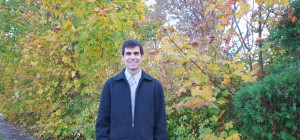Douglas Fisk

WSW: When did you start composing?
DF: That’s a little hard to pinpoint – I grew up improvising on the piano (sometimes instead of practicing my assigned pieces for piano lessons) and experimented a bit with composition in high school. Though piano performance was my focus through college, I continued to improvise frequently and composed some small pieces for a composition class. I began private composition study a few years after I completed my undergrad degree.
WSW: What drew you to composing?
DF: I seemed to gravitate towards it naturally, first through playing by ear and improvisation, then later more seriously through a kind of persistent inner sense that there was something there to explore and develop.
WSW: Do you play an instrument or sing?
DF: Primarily piano, though I also play some violin and I sang in choirs growing up and through college.
WSW: What has been your biggest challenge in composing?
DF: To me, it seems that the issue of large scale form and its connection to smaller scale harmonic choices is a challenge in post-tonal composition. Certainly there are many solutions to connecting the small and large scale, but I find that creating/discovering solutions that are equally appealing to my ear and my intellect takes some time and effort.
WSW: Which composer do you admire?
DF: I’ll list a few composers whose music has made a particularly strong impact: Franz Schubert, Claude Debussy, Ruth Crawford Seeger, György Kurtág, Martin Bresnick.
WSW: What do you do in your free time?
DF: I exercise, play tennis, read/study, meditate, walk, and sometimes watch a little TV.
WSW: Tell us a little about the quintet.
DF: This quintet is in four movements. The first unfolds gradually, as sustained harmonies combine with lyrical solo lines. The second movement is based on a harmonic progression heard in full only at the end of the movement in a chorale-like texture; the movement opens with fragments of the harmonic material appearing in short melodic bursts distributed throughout the ensemble. The third movement, Quasi Barcarolle, is based on an undulating melodic figure occurring at different speeds within each instrument. The fourth movement, marked “Harsh and Exciting,” is centered upon an insistent repeating figure. The performance indication is intended both to describe the desired quality of sound and also as a reference to Mary Oliver’s well known poem, “Wild Geese”:
Meanwhile the wild geese, high in the clean blue air,
are heading home again.
Whoever you are, no matter how lonely,
the world offers itself to your imagination,
calls to you like the wild geese, harsh and exciting –
over and over announcing your place
in the family of things. (12 – 18)
Want more info on Douglas? Click here for his website!





